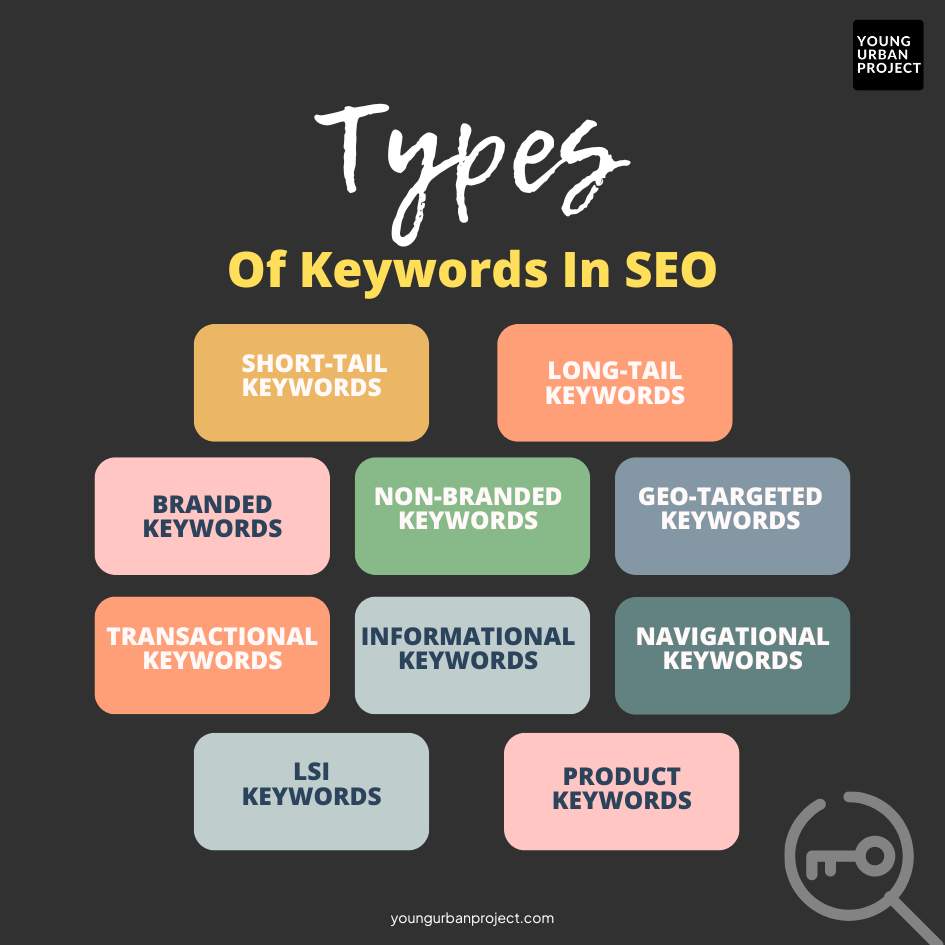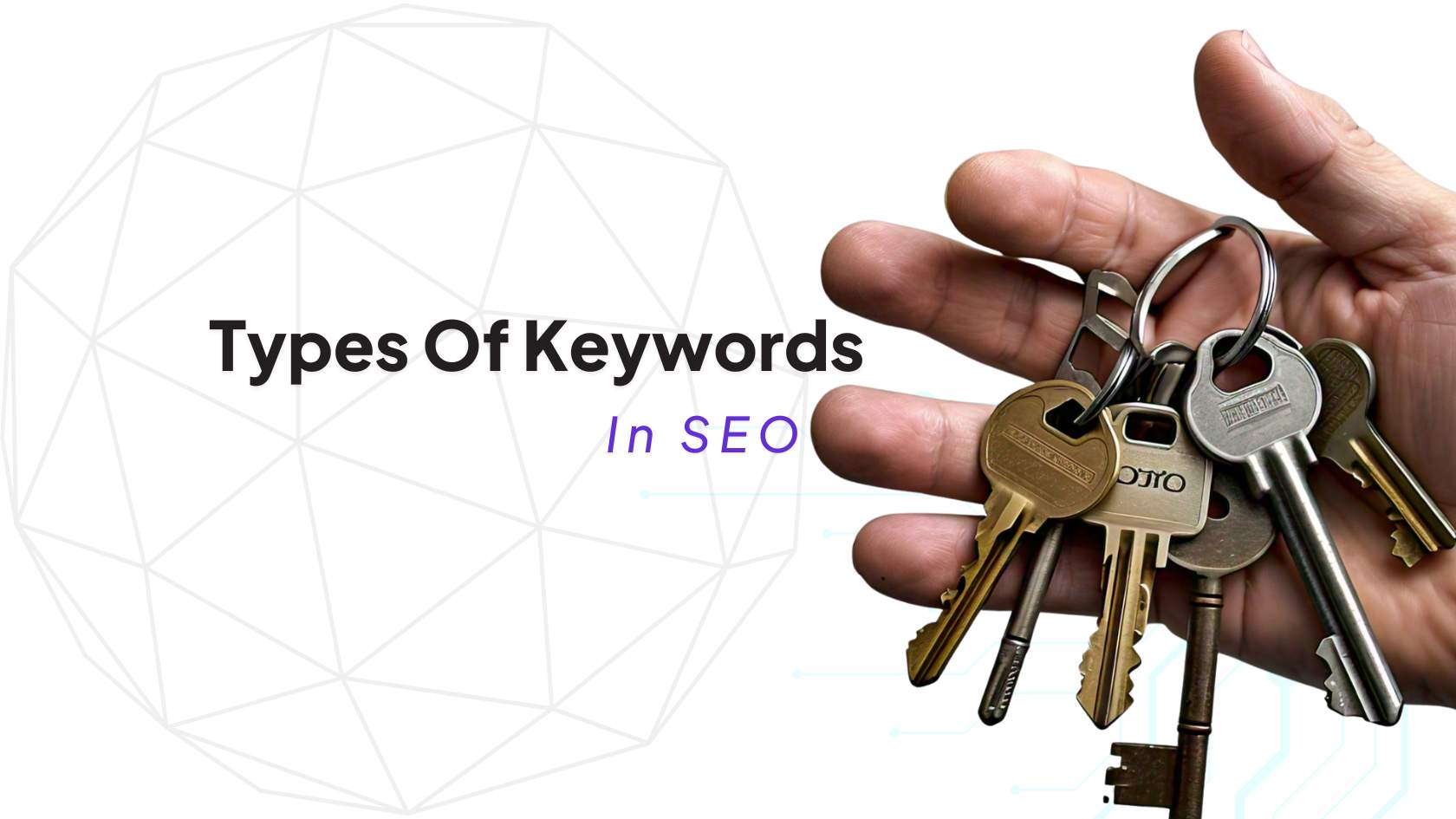In Search Engine Optimization (SEO), understanding the types of keywords in SEO helps you strategically use keywords for increasing your website’s visibility and driving traffic. Whether you’re new to SEO or looking to refine your approach, knowing the different types of keywords is critical for staying ahead in the highly competitive digital space.
In this guide, let’s look at the types of keywords in SEO, explaining their importance and how to use them effectively. By the end, you’ll have a solid understanding of how each keyword type fits into a larger SEO strategy, empowering you to optimize content that attracts and converts the right audience.
Table of Contents
What is a Keyword?
A keyword is a specific word or phrase that represents the primary topic of a webpage or piece of content. It’s what people type into search engines like Google when they’re looking for information, products, or services. Essentially, keywords act as a bridge between what people are searching for and the content you provide.
For instance, if someone is searching for “best running shoes,” that phrase is the keyword. Keywords can vary in length and specificity, and understanding these differences is crucial to using them effectively in SEO.
There are two main types of keywords:
- Short-tail keywords (also known as head terms): These are usually one to two words long and cover broad topics. For example, “shoes” or “SEO.”
- Long-tail keywords: These are longer and more specific keyword phrases, often three words or more. An example would be “best running shoes for flat feet.”
But beyond short-tail and long-tail, there are many other types of keywords in SEO, each serving a unique purpose in your SEO strategy.
Importance of Keywords in SEO
Keywords are at the heart of any effective SEO strategy. They act as the primary signals that search engines use to determine the relevance and value of your content. Here’s why they’re essential:
Search Engine Visibility
Keywords help search engines understand what your page is about, making it easier for them to rank your site for relevant search queries. Without the right keywords, your website may never appear in search results for the topics that matter most to your audience.
Targeted Traffic
By optimizing your content for the right keywords, you can attract the right kind of visitors. Keywords allow you to align your content with what potential customers are already searching for, driving more relevant traffic to your site.
Improved User Experience
Using the right keywords ensures that your content matches user intent. When your content answers the exact questions or needs of your audience, you provide a better experience, leading to higher engagement and better rankings.
Competitive Advantage
Understanding and utilizing different types of keywords in SEO can give you an edge over competitors. If you target keywords that your competitors are missing, you can carve out a niche and dominate search results in specific areas.
Also Read: What is a Backlink Profile? Types and How to Create it
Types of Keywords in SEO

1. Short-Tail Keywords
Short-tail keywords, often called head keywords, are broad and usually consist of one or two words. These keywords target large volumes of traffic, but they’re also highly competitive. For example, “laptops” or “marketing.”
Pros:
- Large search volume, attracting lots of traffic.
- Ideal for brand awareness and broad topic coverage.
Cons:
- High competition, making it difficult to rank.
- Low user intent, often resulting in lower conversion rates.
While short-tail keywords are an important part of any SEO strategy, they need to be complemented by more specific keyword types to effectively capture and convert your audience.
2. Long-Tail Keywords
Long-tail keywords are much more specific, often consisting of three or more words. These keywords typically attract a smaller but more targeted audience. Examples include “best laptops for college students” or “how to do SEO for small businesses.”
Pros:
- Lower competition due to their specificity.
- Higher conversion rates since they target users with clear intent.
Cons:
- Lower search volume, which means fewer visitors.
Long-tail keywords are critical for targeting users who are ready to make a decision or perform an action, making them essential for driving conversions.
3. Branded Keywords
Branded keywords include the name of a specific brand, like “Apple MacBook” or “Nike running shoes.” These are terms where users are specifically looking for a particular brand.
Pros:
- High conversion potential since users already know the brand.
- Lower competition for small brands.
Cons:
- Limited reach since they only attract users who are already familiar with the brand.
Branded keywords are important for maintaining brand loyalty and capturing users who are already interested in what you offer.
4. Non-Branded Keywords
Non-branded keywords are generic terms like “laptop” or “running shoes” that don’t include any specific brand name. These are crucial for attracting new customers who aren’t yet familiar with your brand.
Pros:
- Broader reach to attract new audiences.
- Essential for building brand recognition and increasing website traffic.
Cons:
- Higher competition, especially for generic terms.
Non-branded keywords allow you to expand your visibility and bring in new traffic, making them a fundamental aspect of any SEO strategy.
5. Geo-Targeted Keywords
Geo-targeted keywords focus on specific locations, such as “SEO services in New York” or “best restaurants in Tokyo.” These are particularly useful for local businesses looking to attract customers in a specific geographic area.
Pros:
- Highly relevant for local searches, attracting nearby customers.
- Less competition compared to national or global keywords.
Cons:
- Limited reach to a specific geographic area.
Geo-targeted keywords are essential for local SEO, ensuring that your business appears in search results for customers near your location.
6. Transactional Keywords
Transactional keywords are search terms that indicate a user’s intent to make a purchase or perform an action, such as “buy iPhone 14” or “best deals on running shoes.”
Pros:
- High conversion rate since these users are ready to take action.
- Clear user intent, making it easier to cater to their needs.
Cons:
- High competition due to their strong commercial intent.
Optimizing for transactional keywords is critical for driving sales and conversions. These keywords target users at the bottom of the sales funnel, making them valuable for businesses looking to generate revenue through SEO.
7. Informational Keywords
Informational keywords are used when users are searching for information rather than looking to buy something. Examples include “how to train a dog” or “what is SEO.”
Pros:
- High traffic potential as many users search for information.
- Great for building brand authority and educating your audience.
Cons:
- Lower conversion rate since users are not necessarily looking to buy.
Informational keywords are key to building trust and authority with your audience. While they may not result in immediate conversions, they are important for nurturing potential customers by providing value upfront.

8. Navigational Keywords
Navigational keywords are used when a user is searching for a specific website or page, such as “Facebook login” or “Amazon customer support.”
Pros:
- High relevance since users know exactly what they’re looking for.
- Clear intent, often resulting in higher engagement on the page they visit.
Cons:
- Limited traffic since users are already familiar with the destination.
While navigational keywords may not bring in new users, they ensure that your website is easy to find for returning visitors or those specifically searching for your brand.
9. LSI (Latent Semantic Indexing) Keywords
LSI keywords are terms that are semantically related to your main keyword. For example, if your target keyword is “digital marketing,” LSI keywords might include “online marketing,” “content marketing,” or “SEO strategies.”
Pros:
- Helps search engines understand the context of your content.
- Improves your chances of ranking for your target keyword by providing relevant supporting terms.
Cons:
- Indirect impact on traffic, as they are supplementary rather than primary keywords.
Incorporating LSI keywords into your content ensures that you cover a broader range of related topics, which enhances your content’s value and relevance for both search engines and users.
10. Product Keywords
Product keywords are specific search terms that include the name of a product or service, such as “Samsung Galaxy S21” or “Apple AirPods Pro.”
Pros:
- High conversion potential since users are often looking to make a purchase.
- Highly relevant to users already interested in your product.
Cons:
- Limited reach to users searching for that specific product.
For e-commerce businesses, product keywords are crucial for driving sales and ensuring that your products are easily discoverable by potential buyers.
Also Read: How to Create Backlinks for a New Website – Best 4 Ways
Conclusion
Understanding the types of keywords in SEO is essential for developing a well-rounded SEO strategy. Each type of keyword serves a unique purpose, from attracting large volumes of traffic with short-tail keywords to capturing high-intent searchers with transactional keywords. By incorporating the right mix of keyword types—short-tail, long-tail, branded, non-branded, geo-targeted, and more—you can optimize your content to drive both traffic and conversions.
By strategically using these types of keywords in SEO, you’ll improve your search rankings, attract more targeted visitors, and ultimately grow your business online. Whether you’re focusing on informational keywords to build authority or transactional keywords to drive sales, a well-thought-out keyword strategy is the key to success in the digital landscape.
FAQs: Types Of Keywords In SEO
What are the different types of keywords in SEO?
There are several types of keywords in SEO, including short-tail keywords, long-tail keywords, branded and non-branded keywords, transactional, informational, geo-targeted, navigational, LSI (Latent Semantic Indexing) keywords, and product-specific keywords.
What is the difference between short-tail and long-tail keywords?
Short-tail keywords are broad, usually one or two words (e.g., “shoes”), while long-tail keywords are more specific phrases, typically three or more words (e.g., “best running shoes for flat feet”). Short-tail keywords have high search volume but low conversion rates, while long-tail keywords attract more targeted traffic with higher conversion rates.
Why are long-tail keywords important for SEO?
Long-tail keywords help you attract more qualified traffic because they are more specific and often reflect a user’s intent to take action, such as making a purchase. They are also less competitive, making it easier to rank for them.
What are branded keywords?
Branded keywords include the name of a specific brand, like “Nike running shoes” or “Apple iPhone.” These keywords attract users who are already familiar with or loyal to a brand.
What is the role of informational keywords in SEO?
Informational keywords are used by users who are seeking information or answers to questions (e.g., “how to cook pasta”). They are important for building brand authority and driving traffic from users who are in the research phase.
What are transactional keywords, and why are they important?
Transactional keywords are search terms that signal a user’s intent to make a purchase or take an action (e.g., “buy iPhone 14 online”). They are crucial for driving conversions, as they target users who are ready to make a decision.
How do geo-targeted keywords work?
Geo-targeted keywords focus on a specific location, such as “SEO services in New York” or “best restaurants in Los Angeles.” They are important for local SEO strategies and help businesses attract customers from specific geographic areas.
What are LSI keywords, and how do they impact SEO?
LSI (Latent Semantic Indexing) keywords are terms that are semantically related to your main keyword. For example, for the main keyword “digital marketing,” LSI keywords might include “SEO strategies” or “online advertising.” Using LSI keywords helps search engines understand the context of your content and improves ranking potential.
How do product keywords differ from other types of keywords?
Product keywords are search terms that include specific product names, like “Samsung Galaxy S21” or “Apple AirPods Pro.” These keywords are valuable for e-commerce SEO because they target users who are interested in purchasing a specific product.
What are non-branded keywords, and why are they important?
Non-branded keywords are generic terms that do not include a specific brand name (e.g., “running shoes”). They are essential for reaching new audiences who may not be familiar with your brand but are searching for products or services you offer.

